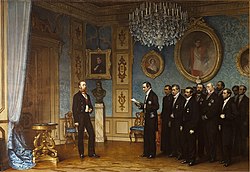The Mexican nobility were a hereditary nobility of Mexico, with specific privileges and obligations determined in the various political systems that historically ruled over the Mexican territory.

The term is used in reference to various groups throughout the entirety of Mexican history, from formerly ruling indigenous families of the pre-Columbian states of present-day Mexico, to noble Mexican families of Spanish (as well as Mestizo) and other European descent, which include conquistadors and their descendants (ennobled by King Philip II in 1573), untitled noble families of Mexico, and holders of titles of nobility acquired during the Viceroyalty of the New Spain (1521–1821), the First Mexican Empire (1821–1823), and the Second Mexican Empire (1862–1867); as well as bearers of titles and other noble prerogatives granted by foreign powers who have settled in Mexico.
The Political Constitution of Mexico has prohibited the State from recognizing any titles of nobility since 1917. The present United Mexican States does not issue or recognize titles of nobility or any hereditary prerogatives and honors. Informally, however, a Mexican aristocracy remains a part of Mexican culture and its hierarchical society.
© MMXXIII Rich X Search. We shall prevail. All rights reserved. Rich X Search
